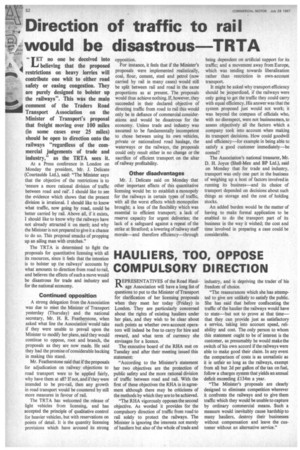Direction of traffic to rail be disastrous TRTA
Page 54

If you've noticed an error in this article please click here to report it so we can fix it.
"T ET no one be deceived into
JLJ believing that the proposed restrictions on heavy lorries will contribute one whit to either road safety or easing congestion. They are purely designed to bolster up the railways". This was the main comment of the Traders Road Transport Association on the Minister of Transport's proposal that freight moving over IN miles (in some cases over 25 miles) should be open to direction onto the railways "regardless of the commercial judgements of trade and industry," as the TRTA sees it.
At a Press conference in London on Monday the president, Mr. J. Delicate (Courtaulds Ltd.), said: "The Minister says that the objective of the restrictions is to 'ensure a more rational division of traffic between road and rail'. I should like to see the evidence which shows that the present division is irrational. I should like to know what traffic, now going by road, could be better carried by rail. Above all, if it exists. I should like to know why the railways have not already attracted it on merit; and why the Minister is not prepared to give it a chance to do so. This proposal smacks of propping up an ailing man with crutches."
The TRTA is determined to fight the proposals for quantitative licensing with all its resources, since it feels that the intention is to bolster up the railways' accounts by what amounts to direction from road to rail, and believes the effects of such a move would be disastrous for trade and industry and for the national economy.
Continued opposition
A strong delegation from the Association was due to meet the Minister of Transport yesterday (Thursday) and the national secretary, Mr. H. R. Featherstone, when asked what line the Association would take if they were unable to prevail upon the Minister to modify her plans, said they would continue to oppose, root and branch, the proposals as they are now made. He said they had the promise of considerable backing in making this stand.
Mr. Featherstone said that if the proposals for adjudication on railway objections to road transport were to be applied fairly, why have them at all? If not, and if they were intended to be pro-rail, then any growth in road transport would be countered by still more measures in favour of rail.
The TRTA has welcomed the release of light vehicles from licensing, and has accepted the principle of qualitative control for heavier vehicles, but with reservations on points of detail. It is the quantity licensing provisions which have aroused its strong opposition.
For instance, it feels that if the Minister's proposals were implemented realistically, coal, flour, cement, steel and petrol (now carried by rail in many cases) would still be split between rail and road in the same proportions as at present. The proposals would thus achieve nothing. If, however, they succeeded in their declared objective of directing traffic from road to rail this would only be in defiance of commercial considerations and would be disastrous for the economy. Unless trade and industry was assumed to be fundamentally incompetent to chose between using its own vehicles, private or nationalized road haulage, the waterways or the railways, the proposals could only result either in no change or the sacrifice of efficient transport on the altar of railway profitability.
Other disadvantages
Mr. J. Delicate said on Monday that other important effects of this quantitative licensing would be: to establish a monopoly for the railways in certain types of traffic, with all the worst effects which monopolies brought; a loss of the flexibility which was essential to efficient transport; a lack of reserve capacity for urgent deliveries; the lack of a safeguard against a repeat of the strike at Stratford; a lowering of railway staff morale—and therefore efficiency—through being dependent on artificial support for its traffic; and a movement away from Europe, which was tending towards liberalization rather than restriction •in own-account transport.
It might be asked why transport efficiency should be jeopardized, if the railways were only going to get the traffic they could carry with equal efficiency. His answer was that the system proposed just would not work; it was beyond the compass of officials who, with no disrespect, were not businessmen, to assess objectively all the factors which a company took into account when making its transport decisions. How could goodwill and efficiency—for example in being able to satisfy a good customer immediately—be costed?
The Association's national treasurer, Mr. D. H. Joyce (Shell-Mex and BP Ltd.), said on Monday that for trade and industry, transport was only one part in the business of weighing up a host of factors involved in running its business—and its choice of transport depended on decisions about such things as storage and the cost of holding stocks.
An added burden would be the matter of having to make formal application to be enabled to do the transport part of its business in the way it wished; the cost and time involved in preparing a case could be considerable.




































































































































































